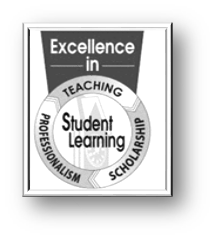II. Educator Preparation Conceptual Framework
Quality Assurance System
Educator Preparation Programs
II. Educator Preparation Conceptual Framework CAEP: Self-Study Material, Standard 1.1, A.1
The Educator Preparation Unit at Columbus State University prepares highly qualified teachers, counselors, and leaders to produce high levels of P-12 student learning. Demonstrating excellence in teaching, scholarship, and professionalism, educators continually acquire, integrate, refine, and model these qualities as they develop proficiency, expertise, and leadership. In an environment that promotes democratic ideals and practices, educator preparation faculty guide individuals in this developmental process.
The visual model below represents the key features of the conceptual framework. The circle represents the continual process of acquiring, integrating, refining, and modeling excellence in teaching, scholarship, and professionalism. The arrows represent the interdependence of these qualities. The result of our efforts to achieve excellence in teaching, scholarship, and professionalism will be improved student learning at the P-12 and university levels, ultimately resulting in closing the achievement gap among various demographic groups of students.
Teaching
Excellence in teaching embodies the use of best practices to improve student learning in the university as well as the P-12 classroom. Within the learning community in the College of Education and Health Professions, faculty employ best practices in the preparation of teachers, counselors, and leaders. The ideas and activities that constitute best practice include the use of a variety of tools and strategies to address the needs of diverse [all] learners and the extensive integration of technology to enhance teaching and learning. Faculty model best practices for candidates who then apply similar ideas and activities in P-12 schools and classrooms. Teachers collaborate within communities of learning as they continually seek feedback from peers, mentors, and students and reflect upon the efficacy of their practice. Leaders support and contribute to excellence in teaching by creating and maintaining safe, civil, healthy, and intellectually stimulating school environments that promote high levels of P-12 student learning. Counselors improve student learning by promoting the academic, career, and social development of students. These efforts by teachers, counselors, and leaders provide the necessary tools and environments that result in accomplished P-12 teaching and improved learning for all students in all school settings.
Scholarship
Scholarship is systematized knowledge that is accurate, authoritative, and thorough. Scholarship combines theoretical knowledge with practical applications. Scholars operate within communities of learning as peers, collaborators, mentors, and leaders who construct, critically examine, and reflect upon knowledge. Scholars seek out and explore multiple viewpoints, embracing diversity as it enriches their intellectual lives and positively impacts their professional performance. Scholars actively engage in a life-long learning process, continually acquiring, integrating, refining, and applying knowledge to achieve excellence in teaching and to improve P-16 student learning.
Professionalism
Professionalism comprises a body of knowledge, a set of beliefs, an array of actions or behaviors, and ethical standards that members of a profession agree are the core of their practice. The professional educator demonstrates in-depth knowledge of a field of study and strives to meet its highest standards as represented by the Interstate Teacher Assessment and Support Consortium (InTASC) Model Core Teaching Standards, the National Board for Professional Teaching Standards (NBPTS) Core Propositions, the Council for the Accreditation of Educator Preparation (CAEP) Standards, the Georgia Professional Standards Commission Program Rules and Standards, the Council for the Accreditation of Counseling and Related Programs (CACREP) School Standards, the American School Counselor Association (ASCA) Standards, Professional Standards for Education Leaders (PSEL), and/or specialty association standards.
The professional educator is an active member in the learned societies, professional organizations that set the code of ethics and performance standards for their field. Ultimately, the professional educator is a scholar who models professionalism for students and fosters the development of the knowledge, skills, and dispositions in students which allow them to acquire, integrate, refine, and apply knowledge meaningfully throughout their lives.
In the College of Education and Health Professions, excellence in teaching, scholarship, and professionalism has multiple layers.
- Faculty exhibit scholarship in theoretical and practical pursuits in their area of
expertise; model excellence in teaching through the use of pedagogical best practices
based on current research; seek feedback from colleagues and students; reflect upon
the efficacy of their practice; generate and disseminate new knowledge within their
disciplines; and collaborate within communities of practice in schools, the university,
professional organizations, and the community.
- Teacher, counselor, and leader candidates give their best scholarly efforts in coursework across the university; display intellectual curiosity and a desire to learn; apply models of best practice within their fields or disciplines to bring students from diverse P-12 settings to high levels of learning; seek feedback from peers, mentors, and students; reflect upon the efficacy of their practice; collaborate within communities of learning among their peers, with university faculty and cooperating teachers, and within professional organizations; and model scholarship for the students in their schools and classrooms, inspiring young people to learn through their example.
In summary, the professional educator believes in the transforming role of education in human lives and strives to improve the learning of all P-16 students by achieving excellence in teaching, scholarship, and professionalism.
